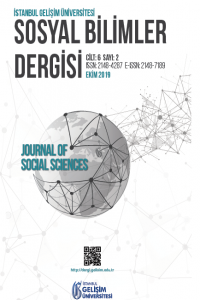Moving from Traditional Intranet to Digital Workplace in Public Sector: The Success Story of TurkStat Intranet
Öz
Is knowledge considered as a valuable asset in public sector? Most of the answers of top public managers would be yes to this question; however it is quite rare to see a public organisation which has a collaborative digital knowledge management platform. Both the knowledge in unwritten formats such as individual's memories and also the knowledge in written forms are locked up in personal computers such as fact sheets, reports and presentations. Therefore, the organisational knowledge is disappeared in the case of public employee turnover. In this case study, the need of contemporary digital Intranet systems with virtual communities of practices in order to have an effective organisational e-collaboration in today's highly virtualisation on working life is underlined. In this regard, the Intranet revaluation of Turkish Statistical Institute, which is one of the first public institutions about identifying the need of e-transformation in the work life, between the years 2012 and 2017 will be investigated in details. Meanwhile, how several beneficial outcomes obtained such as (a) enabling e-collaboration among employees regardless of their location and department, (b) decreasing the cost of organisational communication, (c) integrating organisational software applications and, (d) laying the foundation of participative written organisational memory, will be further explained in this article. In this article the qualitative research approach was adopted and the data collected by observation, interview and document collection techniques. This paper is one of the first studies in which organisational e-collaboration and virtual communities of practice approaches were implemented in a Turkish public sector organisation.
Anahtar Kelimeler
Intranet Digital Workplace Public Sector E-Collaboration Virtual Communities of Practice
Kaynakça
- AZİZ, A., DİCLE, Ü. (2017). Örgütsel iletişim. İstanbul: Hiperlink Yayınları.
- ÇEKİÇ, E. & ÜSTÜNDAĞ, M.T. (2016). İntranet-tabanlı bilişim teknolojileri servis yönetimi uygulaması. Bilişim Teknolojileri Dergisi, 9 (3), 303-314.
- DUBE, L., BOURHIS, A. & JACOB, R. (2006). Towards a typology of virtual communities of practice. Interdisciplinary Journal of Information, Knowledge, and Management, 1, 69-93.
- ERBAY, H. & KÖR, H. (2016). Büyük veri ve büyük verinin analizi. Uluslararası Bilim ve Teknoloji Konferansı, YTSAM, Ankara, 3-6 Ekim.
- eXo Platform Editions and Pricing (2018). Compare plans. Erişim tarihi: 06.05.2018, https://www.exoplatform.com/pricing.
- FARAJ, S., KUDARAVALLI, S., & WASKO, M. (2015). Leading collaboration in online communities. MIS Quarterly, 39 (2), 393-412.
- HITCHINS, S. (2014). The hidden cost of SharePoint. Erişim tarihi: 06.05.2018, https://www.interact-intranet.com/blog/the-hidden-costs-of-sharepoint.
- JOHNS, T. & GRATTON, L. (2013). The third wave of virtual work. Harward Business Review, 91 (1-2), 66-73.
- KALKINMA BAKANLIĞI (2014). Bilgi Toplumu Stratejisi ve Eylem Planı 2014-2018. Ankara.
- KOÇ, M. (2016). 4857 Sayılı İş Kanunundaki Esneklik Düzenlemeleri Ve Uygulama Problemleri, İnsan ve Toplum Bilimleri Araştırmaları Dergisi, 5 (7), 2169-2192.
- LAVE, J., WENGER, E. (1991). Situated learning: legitimate peripheral participation. Cambridge: Cambridge University Press.
- MEISTER, J. C., WILLYERD, K. (2010). The 2020 workplace: how innovative companies attract, develop, and keep tomorrow's employees today. New York: Collins Business.
- METİN, F. & MEDENİ, T.D. (2016). Measuring Organisational Readiness for Successful Online Knowledge Sharing. ADAM Akademi Sosyal Bilimler Dergisi, , 6 (1), 129-155.
- NONAKA, I. (1991). The knowledge-creating company. Harvard Business Review, 96–104.
- SAINT-ONGE, H., WALLACE, D. (2003). Leveraging communities of practice for strategic advantage. Amsterdam: Butterworth-Heinemann.
- TÜİK. (2018). Hanehalkı bilişim teknolojileri (BT) kullanım araştırması, 2018. Erişim tarihi: 06.05.2018, http://www.tuik.gov.tr/PreHaberBultenleri.do?id=27819.
- WATERFORD TECHNOLOGIES (2017). Big data statistics & facts for 2017. Erişim tarihi: 06.05.2018, https://www.waterfordtechnologies.com/big-data-interesting-facts/.
Öz
Anahtar Kelimeler
İntranet Dijital İşyeri Kamu E-İşbirliği Sanal Uygulama Toplulukları
Kaynakça
- AZİZ, A., DİCLE, Ü. (2017). Örgütsel iletişim. İstanbul: Hiperlink Yayınları.
- ÇEKİÇ, E. & ÜSTÜNDAĞ, M.T. (2016). İntranet-tabanlı bilişim teknolojileri servis yönetimi uygulaması. Bilişim Teknolojileri Dergisi, 9 (3), 303-314.
- DUBE, L., BOURHIS, A. & JACOB, R. (2006). Towards a typology of virtual communities of practice. Interdisciplinary Journal of Information, Knowledge, and Management, 1, 69-93.
- ERBAY, H. & KÖR, H. (2016). Büyük veri ve büyük verinin analizi. Uluslararası Bilim ve Teknoloji Konferansı, YTSAM, Ankara, 3-6 Ekim.
- eXo Platform Editions and Pricing (2018). Compare plans. Erişim tarihi: 06.05.2018, https://www.exoplatform.com/pricing.
- FARAJ, S., KUDARAVALLI, S., & WASKO, M. (2015). Leading collaboration in online communities. MIS Quarterly, 39 (2), 393-412.
- HITCHINS, S. (2014). The hidden cost of SharePoint. Erişim tarihi: 06.05.2018, https://www.interact-intranet.com/blog/the-hidden-costs-of-sharepoint.
- JOHNS, T. & GRATTON, L. (2013). The third wave of virtual work. Harward Business Review, 91 (1-2), 66-73.
- KALKINMA BAKANLIĞI (2014). Bilgi Toplumu Stratejisi ve Eylem Planı 2014-2018. Ankara.
- KOÇ, M. (2016). 4857 Sayılı İş Kanunundaki Esneklik Düzenlemeleri Ve Uygulama Problemleri, İnsan ve Toplum Bilimleri Araştırmaları Dergisi, 5 (7), 2169-2192.
- LAVE, J., WENGER, E. (1991). Situated learning: legitimate peripheral participation. Cambridge: Cambridge University Press.
- MEISTER, J. C., WILLYERD, K. (2010). The 2020 workplace: how innovative companies attract, develop, and keep tomorrow's employees today. New York: Collins Business.
- METİN, F. & MEDENİ, T.D. (2016). Measuring Organisational Readiness for Successful Online Knowledge Sharing. ADAM Akademi Sosyal Bilimler Dergisi, , 6 (1), 129-155.
- NONAKA, I. (1991). The knowledge-creating company. Harvard Business Review, 96–104.
- SAINT-ONGE, H., WALLACE, D. (2003). Leveraging communities of practice for strategic advantage. Amsterdam: Butterworth-Heinemann.
- TÜİK. (2018). Hanehalkı bilişim teknolojileri (BT) kullanım araştırması, 2018. Erişim tarihi: 06.05.2018, http://www.tuik.gov.tr/PreHaberBultenleri.do?id=27819.
- WATERFORD TECHNOLOGIES (2017). Big data statistics & facts for 2017. Erişim tarihi: 06.05.2018, https://www.waterfordtechnologies.com/big-data-interesting-facts/.
Ayrıntılar
| Birincil Dil | Türkçe |
|---|---|
| Bölüm | Makaleler |
| Yazarlar | |
| Yayımlanma Tarihi | 22 Ekim 2019 |
| Kabul Tarihi | 1 Mart 2019 |
| Yayımlandığı Sayı | Yıl 2019 Cilt: 6 Sayı: 2 |
 İstanbul Gelişim Üniversitesi Sosyal Bilimler Dergisi Creative Commons Atıf-GayriTicari-Türetilemez 4.0 Uluslararası Lisansı ile lisanslanmıştır. |
|---|


